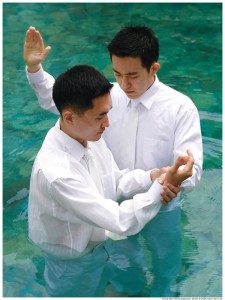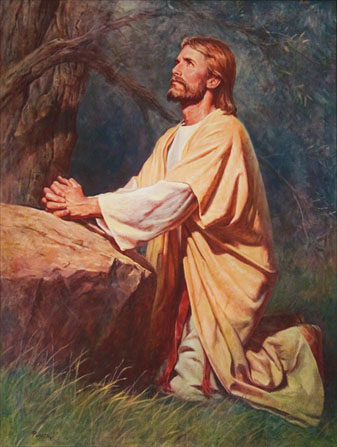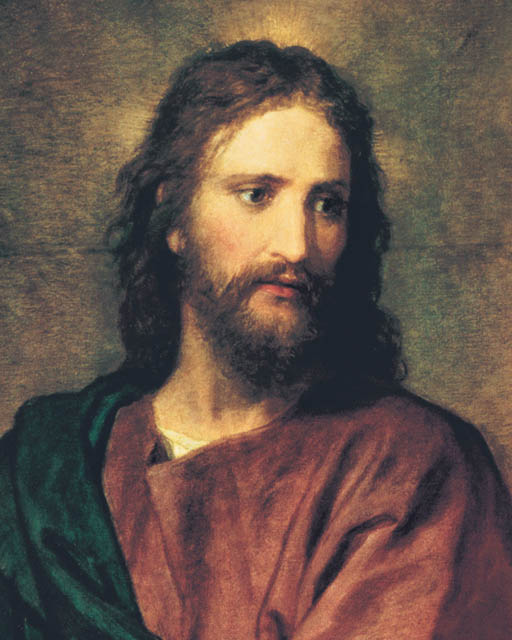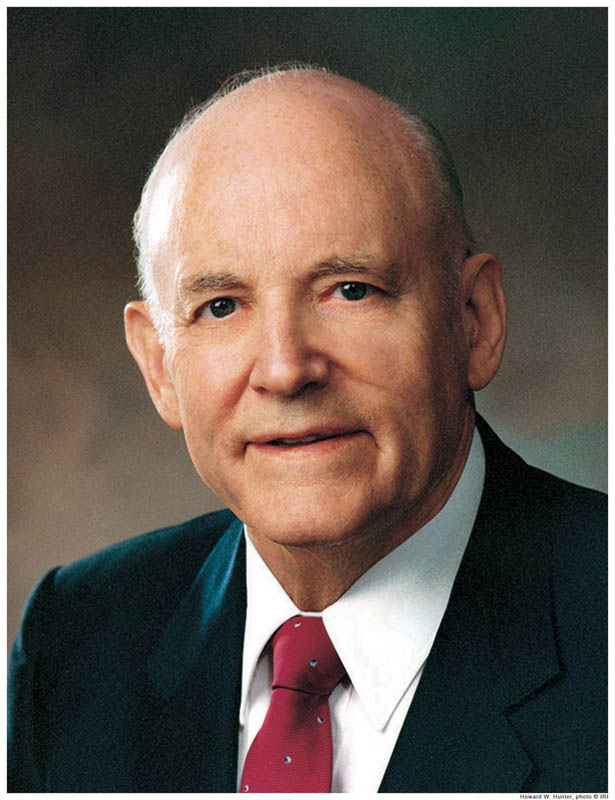“Men are free . . . to choose liberty and eternal life, through the great Mediator of all men, or to choose captivity and death, according to the captivity and power of the devil ” (2 Ne. 2:27).
“The saints shall be filled with his glory, and receive their inheritance and be made equal with [Christ]” (D&C 88:107).
INTRODUCTION
 Every day we are faced with the gathering storm: increasing family dissolution and pornography; endless violence, terrorism, and wars; looming global pandemics; increasing economic inequality and suffering; political paralysis; and other prophesied “calamities”1 of the latter days. And every day—just as in the premortal “war in heaven”2—each of us chooses either Heavenly Father’s “great and eternal plan of redemption”3; or Satan’s “cunning plan”4 of “captivity and death.”5 Our choice is critical, because only Heavenly Father’s plan offers us both eternal exaltation (equality with Christ) and temporal salvation—“refuge from the storm, and from wrath when it shall be poured out without mixture upon the whole earth.”6
Every day we are faced with the gathering storm: increasing family dissolution and pornography; endless violence, terrorism, and wars; looming global pandemics; increasing economic inequality and suffering; political paralysis; and other prophesied “calamities”1 of the latter days. And every day—just as in the premortal “war in heaven”2—each of us chooses either Heavenly Father’s “great and eternal plan of redemption”3; or Satan’s “cunning plan”4 of “captivity and death.”5 Our choice is critical, because only Heavenly Father’s plan offers us both eternal exaltation (equality with Christ) and temporal salvation—“refuge from the storm, and from wrath when it shall be poured out without mixture upon the whole earth.”6
PART 1—Our Heavenly Father’s loving plan is Christ’s atonement and our obedience.
1. As the children of Heavenly Father, Christ, and Abraham, we share in their identity.
“I am crucified with Christ: nevertheless I live; yet not I, but Christ liveth in me.” (Gal. 2:20).
 Heavenly Father’s plan enables us to fulfill our equal,7 divine, genetic potential as his literal spirit offspring.8 Our Heavenly Father’s plan is “the Atonement of Christ . . . [and our] obedience to the laws and ordinances of the Gospel.”9 Through his atonement and our obedience, we “are born of him and have become his sons and his daughters.”10 As the adopted,11 covenant “children of Christ,”12 we are “his seed”13 and are therefore also the covenant “seed of Abraham.”14
Heavenly Father’s plan enables us to fulfill our equal,7 divine, genetic potential as his literal spirit offspring.8 Our Heavenly Father’s plan is “the Atonement of Christ . . . [and our] obedience to the laws and ordinances of the Gospel.”9 Through his atonement and our obedience, we “are born of him and have become his sons and his daughters.”10 As the adopted,11 covenant “children of Christ,”12 we are “his seed”13 and are therefore also the covenant “seed of Abraham.”14
As the children of Christ, we “put on Christ”15 and share in his identity through the gospel laws and ordinances: We receive and bear his name, Spirit, power, love, truth, freedom, crucifixion, death, burial, resurrection, joy, etc. Through the ordinances and our obedience, we receive Christ and his atonement. As Paul says, we are “crucified with Christ”16 so that he (his Spirit, love, power, etc.) can live in us. Likewise, “we are buried with [Christ] by baptism into death: that like as Christ was raised up from the dead . . . even so we also should walk in newness of life.”17
2. As the children of Christ, we exercise faith in him, repent, and love others equally, as he loves us.
“Love one another; as I have loved you” (John 13:34).
“Ye know the grace of our Lord Jesus Christ, that, though he was rich, yet for your sakes he became poor, that ye through his poverty might be rich . . . that there may be equality” (2 Cor. 8:9, 14).
 As we share in the full spectrum of Christ’s identity, both individually and as members of of his church (“one body in Christ”18), he helps make our burdens light19—he shares our spiritual and physical burdens—and he requires that we do the same for each other: We covenant at baptism that we “are willing to bear one another’s burdens.”20 Scriptural examples of such love and burden-sharing abound. In Enoch’s Zion, for example, “they were of one heart and one mind . . . and there was no poor among them.”21 For about 167 years (A.D. 34–201) in the Zion created by Christ among the Nephites in the Book of Mormon, “there were not rich and poor,” for “they had all things common among them . . . they were in one, the children of Christ”22 In 1831 and 1832, the Lord told Joseph Smith that economic equality is also essential for our latter-day Zion:
As we share in the full spectrum of Christ’s identity, both individually and as members of of his church (“one body in Christ”18), he helps make our burdens light19—he shares our spiritual and physical burdens—and he requires that we do the same for each other: We covenant at baptism that we “are willing to bear one another’s burdens.”20 Scriptural examples of such love and burden-sharing abound. In Enoch’s Zion, for example, “they were of one heart and one mind . . . and there was no poor among them.”21 For about 167 years (A.D. 34–201) in the Zion created by Christ among the Nephites in the Book of Mormon, “there were not rich and poor,” for “they had all things common among them . . . they were in one, the children of Christ”22 In 1831 and 1832, the Lord told Joseph Smith that economic equality is also essential for our latter-day Zion:
“In your temporal things you shall be equal, and this not grudgingly. . . . If ye are not equal in earthly things ye cannot be equal in obtaining heavenly things” (D&C 70:14; 78:6).
“I say unto you, let every man esteem his brother as himself. For what man among you having twelve sons, and is no respecter of them, and they serve him obediently, and he saith unto the one: Be thou clothed in robes and sit thou here; and to the other: Be thou clothed in rags and sit thou there—and looketh upon his sons and saith I am just? Behold, this I have given unto you as a parable, and it is even as I am. I say unto you, be one; and if ye are not one ye are not mine” (D&C 38:25–27).
 Although the Lord postponed the law of economic equality in 1834 because of the Saints’ failure to live it,23 the law of tithing and the Church welfare program today prepare us to live this law at some future time. The welfare program includes both “caring for the poor and needy”24 and working to be self-reliant: “Thou shalt not be idle; for he that is idle shall not eat the bread nor wear the garments of the laborer.”25
Although the Lord postponed the law of economic equality in 1834 because of the Saints’ failure to live it,23 the law of tithing and the Church welfare program today prepare us to live this law at some future time. The welfare program includes both “caring for the poor and needy”24 and working to be self-reliant: “Thou shalt not be idle; for he that is idle shall not eat the bread nor wear the garments of the laborer.”25
(For more information about the history of economic equality, the law of consecration, and the United Orders, see the relevant articles in the online Encyclopedia of Mormonism.26 For more about the welfare program, visit LDS.org.27)
President Thomas S. Monson frequently quotes the Savior’s commandment, “Thou shalt love thy neighbour as thyself,”28 which lies at the heart of the law of equality, the welfare program, and all family and Church service, including temple service. With everyone in the temple “dressed in white,” says President Boyd K. Packer, “[we] feel a oneness and a sense of equality.”29
3. The inhabitants of Zion are promised both temporal salvation and eternal exaltation.
“The gathering together upon the land of Zion, and upon her stakes, may be for a defense, and for a refuge from the storm, and from wrath when it shall be poured out without mixture upon the whole earth” (D&C 115:6).

To read more of Richard’s articles, click the picture.
http://ldsblogs.com/category/richarddolsen
Of course, not every individual Saint will escape all of the effects of the gathering storm, but the Church as a whole, including us and our families, will be protected if we are faithful, including caring for and loving each other equally, as God loves us. Ultimately, as “joint-heirs with Christ,”30 we can fulfill our equal, divine, genetic potential; receive “all that my Father hath;”31 and become fully “at one”32 and fully equal with God and each other: “He makes them equal . . . equal with [Christ].”33 “To him that overcometh will I [Christ] grant to sit with me in my throne, even as I also overcame, and am set down with my Father in his throne.”34
To be continued Thursday, November 20. 2014
NOTES
- See, for example, D&C 1:17
- Rev 12:7
- Alma 34:16
- 2 Ne. 9:28 https://www.lds.org/scriptures/bofm/2-ne/9.28?lang=eng#27
- 2 Ne. 2:27 https://www.lds.org/scriptures/bofm/2-ne/2.27?lang=eng#26
- D&C 115:6 https://www.lds.org/scriptures/dc-testament/dc/115.6?lang=eng#5
- As uncreated intelligences before our spiritual creation as the literal spirit offspring of Heavenly Father, and in our premortal existence as Heavenly Father’s spirit children, we were apparently not equal in our accomplishments and valor (see, for example, D&C 93:29 and Abr. 3:18–25). Nevertheless, as the literal children of Heavenly Father, we were all born with the same genetic heritage and potential to become like him in every way; no offspring of Heavenly Father lacks the genetic makeup to become like him.
- See, for example, Acts 17:29 and Ps. 82:6.
- A of F 1:3
- Mosiah 5:7
- See LDS Bible Dictionary, “Adoption”
- Mosiah 5:7
- Mosiah 15:10–13
- D&C 84:34; see Rom. 4:11 ; Gal. 3:7, 29 ; Abr. 2:10
- Gal 3:27
- Gal 2:20; see Rom. 6:6 ; Isa. 49:16
- Rom. 6:4
- Rom. 12:5; see 1 Cor. 6:15
- See Matt. 11:30; Mosiah 24:14-15; Alma 33:23
- Mosiah 18:8
- Moses 7:18
- 4 Ne. 1:3, 17
- See D&C 105:1–13, 34
- See lds.org, “caring for the poor and needy”
- D&C 42:42
- See Encyclopedia of Mormonism, “Economic History of the Church”; “Equality”; “Consecration [Law of]” ; “United Orders”
- See lds.org, “Welfare”
- Matt. 22:36–39, quoted by President Monson in “Love—the Essence of the Gospel,” Ensign, May 1989
- “The Holy Temple,” Ensign, October 2010
- Rom 8:17
- D&C 84:38
- See John 17:20–23; 4 Ne. 1:17; D&C 35:2; Moses 7:18
- D&C 76:95; D&C 88:107 Those in the celestial kingdom are made “equal with [Christ]” (see D&C 76:50–70, 92–96). Those who are less faithful, in the terrestrial and telestial kingdoms, are not (see D&C 76:71–91, 97–112).
- Rev. 3:21
About richarddolsen
Twitter •






